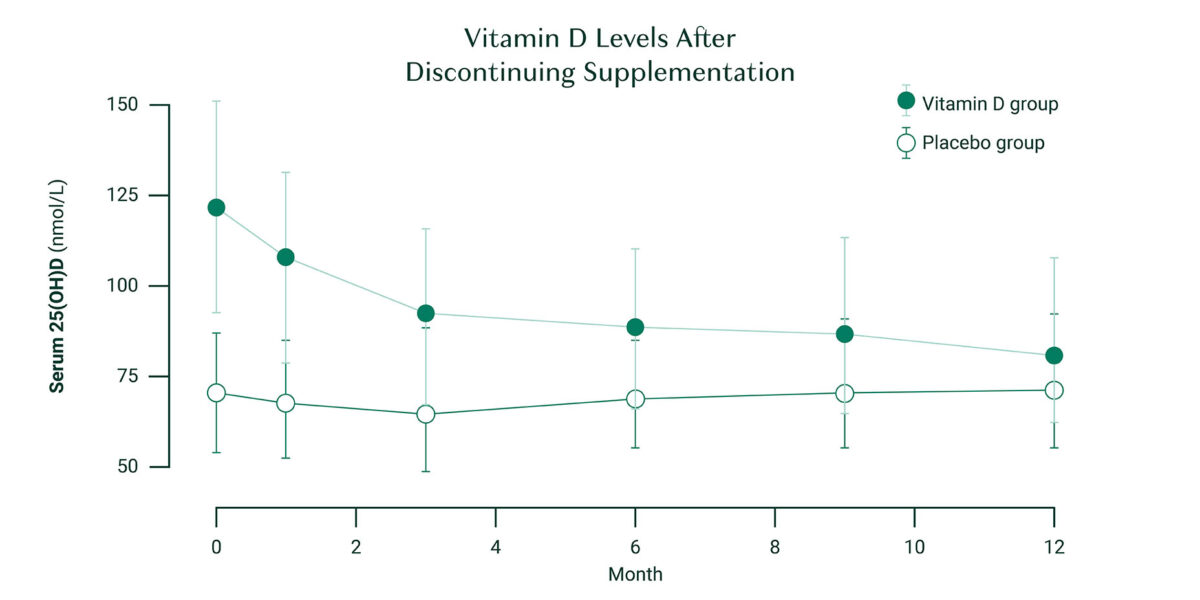Vitamin D has found its place in the spotlight with medical experts in all fields agreeing on one thing; we could all benefit from getting more of this crucial nutrient. And yet many questions remain; how much should we take? Can we store vitamin D in our tissues? What’s the best protocol?
There’s so much information out there that it can be dizzying to even try to sift through it.
But don’t worry, you’re in the right place. In this article we’re going to answer all of your questions so you can feel confident that you’re not only getting sufficient vitamin D, but you’re maximizing your body’s ability to process and utilize it.

Can Your Body Store Vitamin D?
Before we dive into the best way to take vitamin D, we need to explore a very important question; can your body store vitamin D?
Put simply, yes – your body can store vitamin D, but the answer as to how helpful that is for your vitamin D status is a bit more complex.
Unlike vitamin C, which is water-soluble and readily excreted from your body, vitamin D is a fat-soluble vitamin, which means that it has an affinity for your fat tissue. As such, getting high doses of vitamin D increases the storage of this vitamin within your fat cells, sequestering away any excess vitamin D not needed for physiological processes.
This is one reason some people believe they can get enough vitamin D in the summer to carry them through the winter.
However, the research on this is mixed. Even though it’s clear that vitamin D is stored in fat, it’s unclear how much gets released into the blood when you need it. In other words, you could have plenty of vitamin D sitting in your fat cells and also experience a vitamin D deficiency because your body’s physiological needs aren’t being met. There’s not much that vitamin D can do for you until it’s released into your circulation.
With this in mind, there’s some debate as to how usable this stored vitamin D actually is.
For example, a five-year study found that large weekly doses (20,000 IU) of vitamin D3 raised levels of vitamin D stored in fat – no surprise there. The researchers concluded that this storage could significantly affect blood levels of vitamin D up to 12 months after stopping supplementation.
However, they also noted that the release of vitamin D from adipose and other tissues in their study was limited even after the long-term high-dose vitamin D supplementation.
Furthermore, even though the vitamin D group had higher levels of circulating vitamin D in the blood than the placebo group, these levels declined fairly rapidly.
The graph below depicts the blood levels of vitamin D in the control group versus the vitamin D group over 12 months post-supplementation. The line with the green dots represents the vitamin D group that had previously received high doses of vitamin D for 3-5 years. The line below, shown by the white dots, indicates the placebo group. Notice how at the beginning of the data collection, the vitamin D group has a high level of vitamin D in their blood, but this level rapidly drops off. This indicates that after years of high-dose vitamin D, our ability to release vitamin D from our stores rapidly declines.
Due to the inability of high-dose vitamin D to sustain circulation levels, the researchers calculated that it would take a daily intake of 2000 IU of vitamin D3 to maintain a healthy amount of circulating vitamin D [1].

Modified from Figure 1 in “Vitamin D Stored in Fat Tissue During a 5-Year Intervention Affects Serum 25-Hydroxyvitamin D Levels the Following Year”
Can You Store Enough Vitamin D In The Summer To Carry You Through Winter?
So, is it possible to store enough vitamin D over the summer to carry you through the winter? Likely not. Even if you’re out in the sun all day absorbing that vitamin D, any excess that ends up in storage isn’t guaranteed to be released when you need it. Instead, it’s a much better bet to take a vitamin D supplement to ensure that your circulating vitamin D levels stay replete.
What’s The Best Way To Take Vitamin D?
Now that we’ve cleared up some confusion around vitamin D storage, let’s talk about the best way to take vitamin D.
Taking Vitamin D Daily Vs. Less Frequent Large Doses
There are many different types of vitamin D supplements out there, and subsequently, a variety of delivery methods. For example, there’s some thought that taking a large dose of vitamin D may support long-term vitamin D status and help to carry people through the winter.
However, as you just learned, our bodies aren’t that great at storing and then doling out vitamin D as we need it.
In fact, studies show that taking high doses of vitamin D results in a peak of vitamin D in the blood about 7 to 30 days after administration, with a subsequent rapid loss over the next couple of months [2].
Furthermore, there’s some concern about what can happen physiologically when we introduce high levels of vitamin D into our bodies at one time. Your body has a tightly regulated system that controls your vitamin D levels, with a feedback loop involving several other hormonal systems. When we flood the body with vitamin D, it’s possible that we could throw off this delicate balance with some unwanted downstream effects [3].
Even with a bolus dose given once a week, there are some concerns around the potential detrimental impacts [4].
Therefore, once again, it seems that daily supplementation of vitamin D is a safer option than less frequent large doses.

Taking Vitamin D With or Without Food
As mentioned, vitamin D is fat-soluble, which means that it has an affinity for fat and is best absorbed when there are fat molecules present. So taking your vitamin D supplement with a meal will help with overall absorption, especially if you’re consuming fat with your meal.
In one study, researchers found that when participants took their vitamin D supplements with their largest meal of the day, it resulted in a 50% increase in serum levels of vitamin D, compared to taking vitamin D on an empty stomach or with a small meal. They also noted that similar increases were observed in a wide range of vitamin D doses taken for a variety of medical conditions [5].
In short, if you want to get the most out of your vitamin D supplement, take it with food. A meal with a healthy fat source works well, such as these scrumptious salmon-stuffed avocados.
The Best Time Of Day To Take Vitamin D
While vitamin D may help with overall energy levels and sleep quality, its actions are more supportive than stimulating or sedating [6][7]. Therefore, it’s safe to take vitamin D at any time of day. The best time of day to take vitamin D is the time you’re most likely to remember taking it consistently.
The Importance of Vitamin D Testing
All in all, it appears that the best way to take vitamin D is in moderate daily doses, with a meal. But how do you know whether you actually need to supplement with vitamin D? This is where vitamin D testing comes in.
Many people either assume they’re getting enough vitamin D from sunlight, so they dismiss the need for supplementation, or they take a vitamin D supplement simply because they hear it’s good for them. Ideally, you should know your current vitamin D status before deciding whether or not to start supplementing.
Everyone’s body is different, so even if you live in a particularly sunny climate and those around you have sufficient vitamin D, your body may need more. This is why testing for vitamin D levels is so crucial.
The best protocol for vitamin D testing is twice a year, once in the winter and once in the summer. During the summer months, your vitamin D levels will likely improve naturally, so you may need a smaller dose. Similarly, you’ll probably need to beef up your supplementation in the winter when the clouds roll in and you spend less time outside.
Luckily, vitamin D testing is getting easier and more accessible, and you no longer have to make a lab appointment to check your levels – you can do it right from home.
Takeaway
Your body is great at absorbing and storing vitamin D, but as we’ve covered, it may not be the best at releasing it from your fat cells when you need it. Therefore, your safest bet is to find a high-quality vitamin D supplement that you can take daily to ensure that your circulating vitamin D levels remain stable.
While large doses of vitamin D may carry you for a little while, there is some concern regarding the safety of high-dose vitamin D. And ultimately, it doesn’t seem to provide the stability that daily supplementation can.
To learn more about bone health and healthy aging, sign up for the AlgaeCal Newsletter and stay in the loop with the latest research and news.
FAQs
Is it OK to take vitamin D every day?
Yes, in fact, daily supplementation with vitamin D is ideal as this will ensure that the level of vitamin D in circulation remains stable, as opposed to excess being stored in your fat tissue where you can’t guarantee it will be released when you need it.
What is a vitamin D bolus?
A vitamin D bolus is a large single-dose administration of vitamin D. While large doses of vitamin D may carry you for a little while, there is some concern regarding the safety of high-dose vitamin D. And ultimately, it doesn’t seem to provide the stability that daily supplementation can.
Does your body store vitamin D for the winter?
It’s unlikely that getting plenty of vitamin D in the summer can carry you through the winter because your fat tissue may not release stored vitamin D at the amounts you need to sustain optimal blood levels.
Is it better to take vitamin D every day or once a week?
The best way to take vitamin D is in a daily supplement. This way, your body gets a fresh dose of vitamin D directly into circulation instead of relying on vitamin D in storage.
Is vitamin D3 the same as vitamin D?
Vitamin D3 is a form of vitamin D, along with vitamin D2. Vitamin D3 is thought to be superior for supplementation because this is the form that humans naturally make. Studies show D3 to be better absorbed and more effective than D2.





Priscilla Arbuckle
September 18, 2023 , 12:16 pmHow do you test for Vitamin D at home?